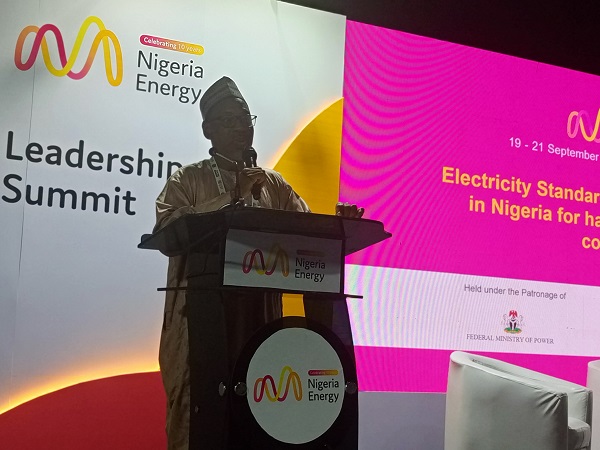Engr. Aliyu Tukur Tahir, MD/CEO of NEMSA
-Felix Douglas
Speaking at the 10th Nigeria Energy Conference and Exhibition held in Lagos, the Managing Director and Chief Executive Officer of Nigerian Electricity Management Services Agency (NEMSA), Engr. Aliyu Tukur Tahir, applauded the event that it has provided needed platforms for developing solutions and partnerships to meet Nigeria’s energy challenges.
Engr. Tahir who spoke on electricity standards was of the view that power has become a necessary part of everyday life, “It is of great benefit to us, we do a lot with it, the benefit has expanded tremendously. Our transportation system is becoming electrified; however, electricity is associated with a lot of hazards and these hazards are real, they can even affect the professionals themselves.”
He added that if electricity is misused or abused, a terrible price is paid and may have injuries and fatalities. “For self-reliable and sustainable electricity supply and use, it is paramount that these hazards are effectively mitigated. Mitigating electricity hazards to make it safe, reliable and sustainable lead to development of technical standards and regulations.
Effective enforcement of these regulations is key to mitigating these hazards associated with electricity and this is one of the reasons why NEMSA was established in Nigeria.
The agency is established to carry out functions of enforcement of technical standards and regulations, technical inspection, testing and certification of all categories of electrical installations and electrical instruments to ensure the efficient production and delivery of safe, reliable, and sustainable electricity power supply as well as guaranteeing safety of lives and property in Nigeria electricity supply industry and allied industries.
Engr. Tahir revealed that in Nigeria, three government agencies are saddled with responsibilities of electrical standards and regulations as well as the enforcement of these regulations and standards in various capacities. The agencies are Standard Organization of Nigeria (SON) which is the sole statutory agency that is vested with the responsibility of standardizing and regulating the quality of all products in Nigeria. Secondly, is the Nigeria Electricity Regulatory Commission (NERC) which is saddled with the development of electricity regulations and codes to protect the interest of consumers, issue licenses to operators and investors, set and review electricity tariff and where possible promote competition.
While NEMSA is the enforcement agency that ensures both standards and regulations established by the two other agencies are effectively enforced and the three agencies collaborate in carrying out their mandates. For example, NEMSA participates in the standard committee of SON that is saddled with the development of standards for electric sector. NEMSA is part of the panels that are responsible for technical standards of NERC.
Engr. Tahir said legal instrument that backs the Electricity Act 2023 which was extensively discussed, regulations developed by regulator is the Nigerian Electricity Supply and Installation Standards (NESIS) Regulations 2015. The grid, distribution and mixing codes which is to enforce these regulations and standards. NEMSA has a lot of resources across the country. It has the inspectorate field offices, meter test stations, chemical and engineering lab.
The agency has engineers that carry out these inspections across the country and ensure enforcement of these technical standards. The statutory activities of NEMSA are grouped into five areas such as electricity networks, grid, off-grid and others. The first area has to do with electrical installations before they are put to use. These installations are subjected to inspection, testing and certification before they are allowed to be used in the country.
The second aspect has to do with existing networks. NEMSA carry out monitoring and evaluation of these existing networks to ensure continuous fitness of the networks across the country. The third aspect is personnel carrying out installation. Before electrical installation works, certification will be carried out of by these personnel to ensure their competence and skill across the country.
The fourth area has to do with the electrical materials and equipment that are deployed for networks.
According to Engr. Tahir, “We carry out certification of these electrical materials and equipment before they are allowed to be used in the networks.”
The general safety of the networks is focused. “We carry out investigation of electrical accidents across the country. The safety performance rankings of utility companies in the country are focused.”
“We have done a number of facilitation measures for effective enforcement of these technical standards and regulations in the country. Some of these measures taken were the production of the Nigeria electrical installation and construction guideline manuals that define these standards and regulations and then give the minimum requirements that these standards are looking for.”
“It illustrates how you carry out your installation works in the country and we also produce guidelines for our various inspections across the country to guide the general inspections. We, through the general observations across our various activities in the country, we also issue out enforcement directives.”
Engr. Tahir said some of enforcement directives that have to do with minimum size of conductors for the 3KV primary feeder lines. The banning of use of substandard materials and electrical equipment across the country and enforcement guidelines on restriction of the use of 3KV primary feeder lines for point load transformer connections across the distribution subsector in the country have been put in place.
Disconnection of structures built in power lines or within the right of power lines across the country are handled by the agency.
NEMSA promotes active working relationships with relevant agencies and other stakeholders to achieve greater efficiency in service delivery. The agency continues to provide its services to all stakeholders in the country and has come to terms that the function of enforcement of standards and regulations requires greater collaboration with relevant stakeholders, especially SON, NERC, security agencies to effectively and seamlessly tackle challenges of delivering safe, reliable and sustainability.


Comment here